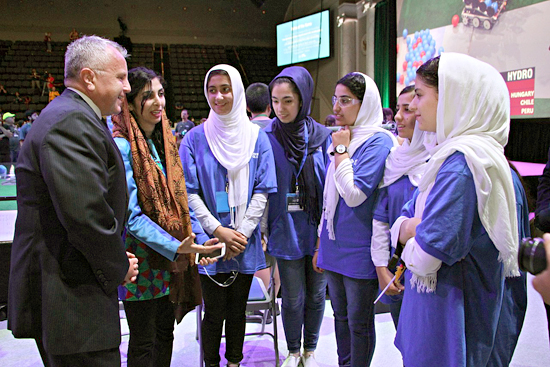
U.S. Deputy Secretary of State John Sullivan meets with the Afghan Girls Robotics Team at the FIRST Global Challenge Robotics Competition in Washington, D.C., on July 18, 2017.
In a war-ravaged Afghanistan, where last year more tax money was paid in bribery throughout the government than was made in taxes, a team of remarkable young women have created a very cheap, open-source ventilator based on a model from the Massachusetts Institute of Technology, to help their country’s Covid-19 response as cases top 35,000 – a number that likely represents only a piece of the viral burden, as testing capacity remains low.
They finished the project in just 5 months, and the new ventilators are portable and battery-powered, allowing them to be easily brought into rural areas for emergency use. Furthermore they cost only around $700 to make compared to the $20,000 cost of a normal ventilator.
The country has been at war for 40 years as near as makes no difference, though "been at war" implies a nation mobilized against another, when in reality they have been victims of aggression and invasion for all 4 of those decades.
It’s a country where women’s rights and women’s education – certainly STEM-focused education – are far from the normal, yet the young women of the Afghan Girls Robotics Team were given guidance from Harvard scientists while pursuing their project.
The Afghan Girls Robotics Team, based out of Herat in the west of the country, are the same legitimate geniuses who won silver and gold in international robotics competitions in 2017 in Washington DC and Estonia respectively with a machine that separates contaminated water from clean water, even though the US denied them visas without cause, and the team leader – a girl of 17 at the time, was told after the DC competition that her father had been killed in a suicide bombing.
Now they’ve reappeared in the news with another invention, and they deserve
a bit of recognition for both their achievements, and for demonstrating to closed-minded
American voters that there is a country underneath the war.
More than just a war
When the New York Times recently broke that an intelligence report, considered as being of medium to low-confidence by various US intelligence divisions, and which contained information that entities within the Russian military were incentivizing Taliban-linked fighters to kill American soldiers in Afghanistan by placing bounties on their heads, they brought America’s longest war back into the mainstream view for all the wrong reasons.
Even though the bounty story was quickly shown to have legs the way a fish has legs, subsequent polls and Congressional meetings demonstrated the damage had been done. 60% of Americans believed the claims to be true, even while Congressional testimony saw the Chair of the Joint Chiefs of Staff and Sec. of Defense describe the story as "uncorroborated," with both men adding they had been made aware of it in no serious way, earlier in 2020, and that multiple generals "did not think it was credible".
By then Rep. Liz Cheney (R – WY) had already lead a bipartisan coalition to amend the 2021 National Defense Authorization Act to prohibit taxpayer money from being utilized to withdraw American troops from Afghanistan unless a long and bureaucratic process of guarantees are made to Congress that American soldiers aren’t being metaphorically hit by the door on their way out.
This week, the House defeated an amendment to the NDAA from Congresswoman Ilhan Omar (D – MN) that would have set out a plan for withdrawing the remaining 8,600 troops in the country. The amendment garnered only a small Democratic majority.
There’s been a steady growth in alarmism among Washington hawks over Donald’s Trump’s policy in Afghanistan, which has been one of make peace, drawdown, and leave, since pretty much the moment he took office. Reports from Politico last week suggested Trump was vetting candidates for a new US ambassador to Afghanistan, one of which is William Ruger, a research fellow at the Cato Institute who is staunchly opposed to military operations or presence in Afghanistan.
In Afghanistan there is a society, a rich cultural heritage, a rich culinary tradition, and three generations of human beings that are desperately tired of war, and as easily as the failures of the Global War on Terror prerogative can be measured by journalists in American blood and treasure, it should be remembered from time to time that it’s the Afghan people that have paid the largest share for America’s failures in South Asia.
Instead of throwing their weight behind an low confidence intelligence report, the New York Times might have wrote about the Afghan Girls Robotics Group and their brilliant work, as they did in 2017, since they and their brilliance exist in a faraway land about which many Americans no nothing, despite the fact it has hosted the longest war in American history.
The robotics team exists under the shadow of a war which doesn’t draw strong opinions from American voters, and that apathy could very well lead to the election of Joe Biden in November. If this comes to pass, and former-President Obama was correct when he said that Biden will surround himself with "all the right people," then Afghanistan might continue to be, for the American people – a war, not a country.
Andy Corbley is founder and editor of World at Large, an independent news outlet. He is a loyal listener of Antiwar radio and of the Scott Horton Show.


